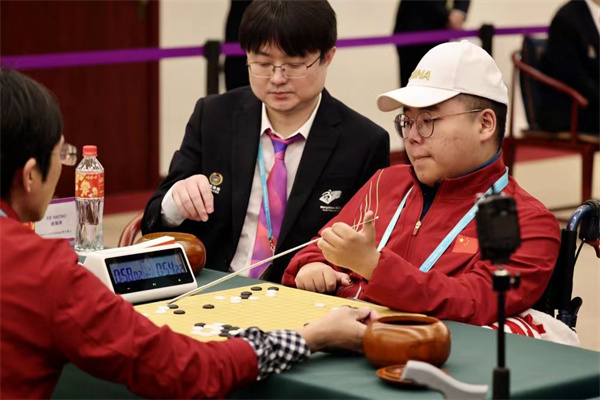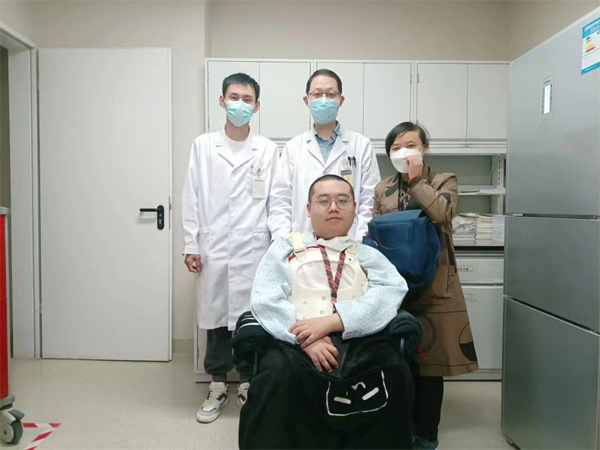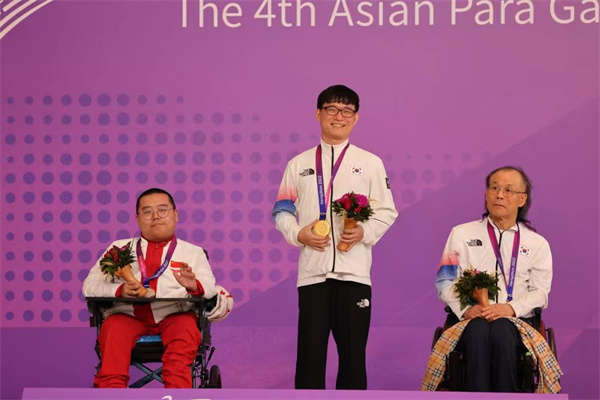
Xie Haitao was competing in the Hangzhou Asian Para Games. [Photo/Xinhua]
Diagnosed with Spinal Muscular Atrophy (SMA) at the age of one, Xie cherished his journey, filled with people who have cared for and supported him.
HANGZHOU -- If life were a game of Go, the 23-year-old Xie Haitao has undoubtedly faced one of the worst starting positions.
He was diagnosed with Spinal Muscular Atrophy (SMA) at the age of one, which is a rare genetic neuromuscular disorder, with an incidence in Chinese newborns ranging from 1 in 6,000 to 1 in 10,000. To this day, it remains an incurable disease, necessitating prolonged and rigorous treatment to achieve the best possible outcomes.
"At first, I could only stumble, but gradually, I lost the ability to walk. My mother had to resign from her job to take care of me," he recounted.
In 2008, Xie's school introduced a go chess interest class, and he immediately fell in love with it.
"It made me feel like this is a sport where I can compete on equal terms with able-bodied individuals," he said.
He also engaged in online matches with fellow enthusiasts, accumulating practical experience. And his natural talent and unwavering dedication led him to achieve an amateur 5-dan certification in just one and a half years.
Though his condition briefly worsened to the point where he couldn't even lift a piece, Xie remained unshaken. At the age of 18, he found the way to not only overcome adversity but also to thrive -- making his first income by providing online go chess lessons.
"Since I was a child, my parents worried about how I would make a living in the future. With a job that sustains me, they worry less," Xie stated.

Xie Haitao (Front), Xie's mother (1st R, Back), Dr. Dai Yi (C, Back) and Dr. Jiang Shan pose for pictures at Peking Union Medical College Hospital in Beijing. [Photo/Xinhua]
Three years later, a piece of good news brightened his life completely.
Following some hard-fought negotiations between the National Healthcare Security Administration and pharmaceutical companies, the SMA drug, Nusinersen, had its cost slashed from 700,000 yuan (about 96,121 U.S. dollars) per injection to 33,000 yuan in 2021 and became part of the national medical insurance catalog. After insurance coverage, the cost per injection was around 10,000 yuan, making the life-saving treatment accessible to ordinary Chinese families.
"I told him not to worry about anything else now. He should come to Beijing, get treatment, and continue his career," said Wang Yuhui, a professional player who had been in a decade-long online exchange and guidance with the younger since 2011.
Xie soon received his first dose of medication. And a multidisciplinary treatment team from Peking Union Medical College Hospital also devised a comprehensive rehabilitation plan for him.
They performed spinal deformity correction surgery, his condition improved significantly with treatment, and he quickly resumed his preparations for the Asian Para Games, earning two silver medals for China at Hangzhou.
"We are delighted for him. Helping patients achieve their dreams is something we take great pride in," Dr. Dai Yi remarked.
Xie cherished his journey, filled with people who have cared for and supported him. In 2014, he established the "Haitao Public Go Chess Class" at a local school for the deaf and mute in his hometown of Xining, China's northwestern Qinghai Province, aiming to introduce more youth to the world of the event and its benefits.

Xie Haitao (L) receives a silver medal at the Hangzhou Asian Para Games. [Photo/Xinhua]
While receiving treatment in Beijing, he also teaches go chess to other children with SMA, becoming a mentor to his young friends. Some of them have discovered the joy and plan to continue being involved in.
Despite the arduous challenges he's faced, he still dreams of becoming a professional go chess player with a disability.
"If there are suitable opportunities to compete, I'll seize them. I am eager to enhance my skills from tournaments," he emphasized.